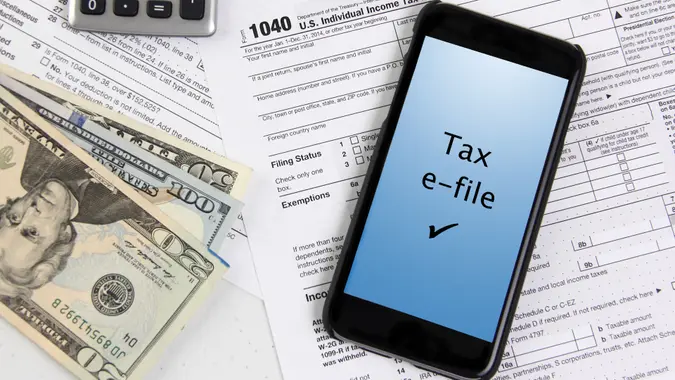The Best Tax Deductions and Tax Breaks for 2023-2024

Commitment to Our Readers
GOBankingRates' editorial team is committed to bringing you unbiased reviews and information. We use data-driven methodologies to evaluate financial products and services - our reviews and ratings are not influenced by advertisers. You can read more about our editorial guidelines and our products and services review methodology.

20 Years
Helping You Live Richer

Reviewed
by Experts

Trusted by
Millions of Readers
You’re probably already aware that you don’t have to pay federal income tax on all of your earnings. However, exactly what are you allowed to deduct from your taxes to lower your total taxable income and finally get a tax break?
See Also: Owe Money to the IRS? Most People Don’t Realize You Can Do This
Although certain tax rates and deductions remain relatively stable from year to year, others change or disappear entirely, so before you bust out the tax software, make sure you know what you can include as deductions when you file.
Quick Take: What Is a Tax Deduction?
A tax deduction is an expense that you can subtract from your income for tax purposes. Tax deductions lower your total amount of taxable income and therefore the total amount of tax you have to pay. Generally, tax deductions are used to encourage certain activities on behalf of individual taxpayers, such as contributing to a retirement account, investing in a business or providing for a dependent.
Best Tax Deductions 2023: Which Are Available To You?
The vast majority of Americans feel confident that they’re receiving all the deductions they’re entitled to claim. However, if you’re doing your own taxes this year, you may want to consult with a certified public accountant to ensure you’re not overlooking additional ways to pay less tax. Here’s a look at 27 deductions you should be aware of when filing your taxes.
1. Medical and Dental Expenses
You can deduct medical and dental expenses for yourself, your spouse and your dependents when you pay taxes.
If you make improvements to your home for medical purposes — such as adding wheelchair ramps or lowering cabinets for better accessibility — you can deduct those renovations as medical expenses. However, you can only deduct the amount of your total medical expenses that exceed 7.5% of your adjusted gross income.
2. Self-Employed Health Insurance
Self-employed individuals with a net profit can deduct self-employed health and long-term care insurance without having to itemize deductions. You can include premiums for yourself, your spouse, your dependents and your children, whether or not the children are your dependents. If you don’t claim 100% of your eligible insurance costs, you can put the remainder toward your itemized medical expense deduction.
Be mindful of the FICA tax rate as well, which includes Social Security and Medicare taxes. If you’re self-employed, you’d be responsible for these taxes.
3. Local and State Sales Tax
Taxpayers have the option of deducting state and local general sales taxes or income taxes that they paid during the tax year, but not both. Under the recent tax law, the deductibility of state and local tax payments for federal income tax purposes is now limited to $10,000 — or $5,000 for married taxpayers filing separately — in a calendar year.
If you live in a state with no income tax, consider deducting state sales tax and local sales tax that you paid.
4. State, Local and Foreign Taxes
You can claim certain taxes as itemized deductions. Apart from state and local sales taxes, you can also deduct:
- Local and state personal property taxes, if the tax amounts are based on the value of the property
- Local and state real estate taxes based on the value of the property
- Foreign, local and state income taxes
5. Jury Duty Pay
If you gave jury pay to your employer because you were paid via salary while you served on a jury, you must still report the payment as income, but you can deduct it from your taxable income.
6. Volunteer Work Donations
You can deduct certain expenses for charity work, such as the cost of gas if you use your car to travel to and from the volunteer site. If you don’t want to calculate the value per mile, you can deduct a standard rate of 14 cents per mile. You can also deduct the cost of purchasing and maintaining uniforms that you wear to a volunteer site or the cost of parking in a garage if that’s required. Just make sure you get documentation from the charity.
7. Charitable Cash Contributions
Your deduction for charitable contributions generally can’t be more than 60% of your adjusted gross income, but in some cases, 20%, 30%, or 50% limits may apply. Due to Coronavirus, the requirement that you itemize deductions was temporarily suspended, but now that rule is back in place.
8. Mortgage Interest Deductions
You can typically deduct the entire amount of your mortgage interest or on the first $750,000, or $375,000 of indebtedness if married filing separately. If your indebtedness started before Dec. 16, 2017, you can deduct up to $1 million, or $500,000 if married filing separately.
9. Mortgage Points
If you itemize, you can deduct the points — or prepaid interest — that you paid to purchase, build or improve your primary home. Typically, if you can deduct all the interest you paid on your mortgage, you can also deduct all of the points.
10. Home Sale
If you sold your primary home at a profit, you can exclude up to $250,000 of gains from your income. If you’re married and filing jointly, you can exclude $500,000.
11. Investment Interest Expense
You can, however, claim a deduction for your investment interest expense, which is the interest paid on money borrowed to purchase taxable investments. The amount that you can claim for the deduction is capped at your net taxable investment income for the year.
12. Gambling Losses
If you suffered gambling losses in 2023, you can deduct up to the amount of gambling income that you reported. You can claim your losses as an “other itemized deduction,” but be prepared to show proof of your winnings and your losses.
13. Some Disaster Losses
You can only deduct disaster losses, which the IRS refers to as casualty losses, if the loss occurred in a federally declared disaster area. The maximum deduction is the lesser of either the adjusted basis of your property, or the decrease in fair market value of your property as a result of the casualty.
14. Military Reservist Travel Expenses
If you travel more than 100 miles from your home as a military reservist, you can deduct travel expenses from the income that you report on your tax return.
15. Health Savings Account Contributions
Health savings accounts are tax-exempt accounts that you use to pay or reimburse certain medical expenses if you have a high-deductible health plan. You can contribute up to $3,650 per year if you have self-only coverage and $7,300 if you have family coverage and deduct the amount you or someone other than your employer made to your account.
16. IRA Contributions or 401(k) Contributions
Although IRS rules don’t allow deductions for Roth IRA contributions, you might be able to claim the amount that you put in a traditional IRA.
401(k) plans provide a special tax status for retirement savings and immediate tax benefits. When you contribute to your 401(k), you’ll effectively lower the amount of your taxable income, so there’s a smaller impact on your take-home pay.
17. Noncash Donations
If you choose to itemize your taxes, you can claim the fair market value — aka the price for which you could have sold the items — of clothing and household items you donated. If you plan to donate your car, make sure you donate to a qualified charity.
18. Health or Dependent Care Flexible Spending Account
If your employer makes available a health or dependent-care flexible spending account, you can contribute pre-tax money and use it to cover eligible expenses. FSAs are use-it-or-lose-it accounts that let you carry over just $610 a year.
19. Home for Business Use (for the Self-Employed)
If you use part of your home for business, you might be able to deduct your home office as an expense. To qualify for this deduction, you must regularly use part of your home exclusively for conducting business and you must show that you use your home as your principal place of business.
Unfortunately, this deduction is not available to employees who worked from home because of the pandemic, even if you were required to work remotely.
20. Car for Business Use (If You’re Self-Employed)
If you use your car for your job or business, you might be able to deduct the costs. You can either use a standard mileage rate or the actual-expense method, which is what it actually costs to operate the car for its business-use portion.
21. Business Travel Expenses
You might be able to deduct ordinary and necessary expenses you incur while traveling for work – but only if you’re one of the following:
- Self-employed
- Farmer
- Armed Forces reservist
- Qualified performing artist
- Fee-basis state or local government official
- Employee with impairment-related work expenses
Costs could include transportation, meals, lodging and airfare. Any expenses that are considered extravagant or lavish don’t qualify for the business travel expenses deduction.
Self-employed individuals claim these expenses on Schedule C (Form 1040). Farmers can use Schedule F (Form 1040). Other eligible individuals should use Form 2106.
22. Educational Expenses
Under the American Opportunity tax credit, you can deduct up to $2,500 per student for four years of postsecondary education. The credit is partially refundable, which means you can get up to 40% of the credit, or $1,000, as a refund if the credit reduces your tax liability to $0.
The Lifetime Learning Credit offsets your tax liability by 20% of your first $10,000 in qualified education expenses, up to a $2,000 limit per year.
23. Work-Related Meals and Gifts
After the tax reform in 2017, entertainment expenses for business purposes were no longer deductible, and meal deductions were limited to 50%. However, after 2022 business meals and beverages from a restaurant, catering or takeout are 100% deductible. You can deduct 50% of the cost of food and beverages not from a restaurant.
Up to $25 of the cost of a business gift can be deducted.
24. Earned Income Tax Credit
The earned income tax credit is a commonly overlooked tax credit for low- to moderate-income individuals. Although it’s not considered an IRS deduction, the EITC is a refundable tax credit meant to supplement income.
25. Educator Expenses
K-12 educators can deduct up to $300 ($600 if married filing jointly and both spouses are eligible educators, but not more than $300 each) of unreimbursed trade or business expenses. To qualify, you must work at least 900 hours in a school year.
26. Student Loan Interest
You can deduct some or all of any qualified student loan interest you paid during the tax year. You can deduct the lesser of $2,500 or the amount you actually paid. You can’t claim the deduction if you’re married and filing separately, or if you or your spouse are listed as dependents on someone else’s tax return.
27. Standard Tax Deduction
The standard deduction is a dollar-for-dollar reduction of your taxable income. Nearly all taxpayers are entitled to this deduction. The standard deduction amounts for tax year 2023 are as follows:
- Single filers: $13,850
- Married filing separately: $13,850
- Married couple filing jointly: $27,700
- Heads of household: $20,800
Final Take To GO: Write-Offs for Tax Year 2023
Every individual has a unique tax situation, so there’s no one answer as to what tax write-offs you can take. However, everyone has some type of tax deduction that they’re eligible for, even if it’s just the standard deduction or specialty issues such as capital gains or child tax credits. The key is to keep accurate records of all of your expenses for the year so you can compare them with IRS regulations to determine if you qualify for certain deductions.
Caitlyn Moorhead, Brooke Barley, Daria Uhlig and Melanie Grafil contributed to the reporting for this article.
 Written by
Written by  Edited by
Edited by 

























